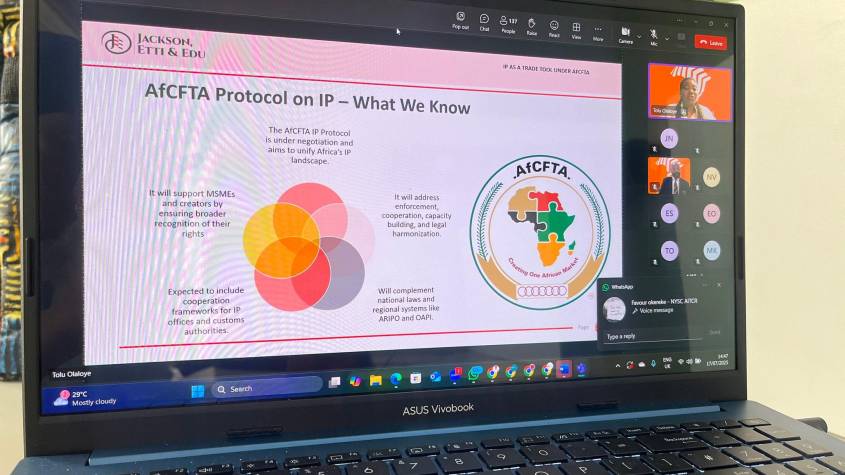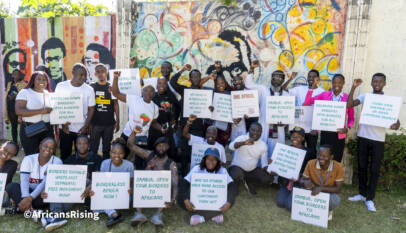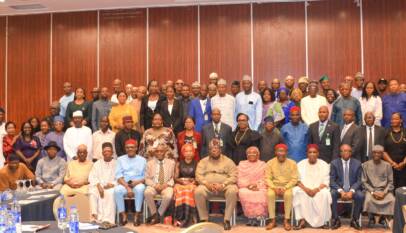AAIPS 2025: Pre-Summit Dialogue Push for Future-Ready IP Ecosystem in Africa
In the lead-up to the 2025 All-Africa Intellectual Property (AAIP) Summit, stakeholders across Africa’s intellectual property (IP) landscape convened last week for a Pre-Summit Dialogue themed “From Idea to Impact: Why Intellectual Property Matters for Africa’s Development,” setting a strong foundation for what promises to be a landmark summit.

The Pre-Summit Dialogue served as a curtain-raiser to the highly anticipated 6th All Africa IP Summit (AAIPS 2025), scheduled for November 12–14 in Dakar, Senegal, under the theme “Building an Inclusive IP Ecosystem for Africa’s Future.” The session provided a platform to examine the urgent need for harmonised intellectual property (IP) laws and institutions to advance Africa’s IP-driven growth and innovation.
The dialogue featured discerning perspectives from leading IP professionals, including Tolu Olaloye, Partner at Jackson, Etti & Edu; David Bahige, Associate at Trust Law Chambers; and Abel-John Ngollo, Founder of Elessa & Partners Law Firm. The keynote address was delivered by Esohe Olajide on behalf of Desire Laumou, Head of the Intellectual Property Rights Division at the AfCFTA Secretariat. Various speakers underscored the vital link between IP, economic policy, and regional trade integration under the African Continental Free Trade Area (AfCFTA).
In his welcome remarks, Sand Mba-Kalu, Chair of AAIPS 2025 emphasized the importance of tailoring Africa’s IP ecosystem to the continent’s unique realities, reinforcing the Summit’s pan-African ambition of building an IP framework that is not only inclusive but also economically transformative. “Building an ecosystem is one thing, but having an ecosystem that speaks to our needs is another.”
Against this backdrop, the session’s discussions underscored the urgent need to raise awareness of intellectual property, strengthen local enforcement capacity, and foster deeper collaboration between national and regional IP institutions. The event marked a pivotal milestone ahead of the main Summit, which is expected to build on these key recommendations and drive forward a more inclusive and effective IP ecosystem for Africa.
“Bridging IP Laws–Enforcement Gap Urgent, Non-Negotiable” — Olaloye
In her remarks, Tolu Olaloye, Partner at the Lagos-based African law firm Jackson, Etti & Edu, emphasized the persistent enforcement gaps for IP rights across many African jurisdictions. She underscored the vital importance of policy consistency and institutional reform in strengthening IP protection across the continent, noting that meaningful progress will require both legal and systemic changes to ensure IP laws are effectively implemented and respected.
“There is an urgent need to address the disparity between existing IP laws and the enforcement mechanisms on the ground. In many jurisdictions, there is a lack of coordination between enforcement agencies, inadequate training, and insufficient understanding of IP issues, which leads to rights holders being inadequately protected,” she said.
Olaloye also noted that effective IP regimes are central to building investor confidence, particularly in the creative and innovation sectors, which have the potential to contribute significantly to Africa’s GDP if adequately protected and monetised. She stressed that without strong legal frameworks and enforcement mechanisms, creators and innovators are left vulnerable to exploitation, discouraging both local and foreign investment.
“Strong IP systems foster innovation and creativity by ensuring that rights holders are fairly rewarded. This, in turn, encourages further investment in research and development, and helps Africa transition from a consumer economy to a knowledge-based one. When creators, innovators, and entrepreneurs can trust that their ideas will be protected, they are more likely to invest time and resources in developing new products and services,” she noted.
Olaloye further called for greater synergy between legal practitioners, enforcement agencies, and policymakers across African countries to bridge existing implementation gaps, stressing that a unified, continent-wide approach to IP protection is necessary not only for safeguarding innovations but also for building a resilient ecosystem that supports creativity, industrial growth, and competitiveness within the AfCFTA framework.
“We need a collaborative ecosystem where legal, regulatory, and enforcement institutions work seamlessly. Only then can we fully unlock the economic potential of IP across Africa. We need a collaborative ecosystem where legal, regulatory, and enforcement institutions work seamlessly. Only then can we fully unlock the economic potential of IP across Africa,” Olaloye added.
“Africa Needs Unified, Locally Grounded IP System” – Bahige
David Bahige, Associate at Trust Law Chambers bemoaned the current fragmentation of IP systems across Africa, which he argued hinders the realisation of a truly unified continental IP market calling for harmonised laws and frameworks that align with AfCFTA’s vision.
“Most African countries operate within isolated IP systems that are often outdated or incompatible with regional trade goals. This lack of harmonisation not only creates legal uncertainty in the region but also discourages innovation and cross-border collaboration,” he explained.
Bahige emphasized that the AfCFTA presents a critical opportunity for African nations to forge a common IP agenda that advances shared continental interests—particularly in high-impact sectors such as biotechnology, digital media, and traditional knowledge. He noted that a unified IP framework under the AfCFTA would not only strengthen legal certainty and boost investor confidence but also ensure African innovators are adequately protected and fairly rewarded.
“Africa’s innovation ecosystem must be protected through frameworks that reflect our local realities in Africa while also meeting international standards. We can’t afford to copy and paste foreign models; we need a tailored IP regimes that will empower African innovators,” he stressed.
Bahige also urged young legal professionals to take a proactive role in shaping the future of Africa’s IP by contributing to the development of local IP jurisprudence, mentoring emerging startups, and engaging in ongoing policy reform processes. He emphasized that their active involvement is essential to building a robust, future-ready IP system that is reflective of Africa’s unique socio-economic realities and poised to support innovation and inclusive growth.
“The youth have a unique opportunity to redefine Africa’s IP identity. By engaging in IP education, advocacy, and reform, we can build a new generation of IP-conscious professionals committed to Africa’s growth,” he concluded.
“IP New Currency of Today’s Knowledge Economy” – Ngollo
Abel-John Ngollo, Founder of Elessa & Partners Law Firm spoke on the intersection of intellectual property and industrial development, particularly within the context of Africa’s informal economy, underscoring the importance of raising IP awareness among local entrepreneurs, artisans, and creatives.
“Most innovations in Africa happen within the informal sector, yet these creators lack the awareness and tools to protect their intellectual assets. We need targeted education and support systems that bring IP to the grassroots. We can no longer treat IP as the concern of lawyers and corporations alone. Every market woman with a unique herbal mixture, every tailor with a distinct design, is an IP owner. They deserve recognition and protection,” he stressed.
Ngollo argued that building national IP cultures that recognise the value of local knowledge and creativity is essential to ensuring inclusive growth and reducing the vulnerability of African creators to exploitation, calling for the integration of IP education into national development strategies and the formal education system.
“Let us institutionalise IP education in schools and professional training centres. When young people understand IP early, they grow up knowing how to protect and monetise their creativity. Embedding IP awareness in national education frameworks is key to cultivating a generation that sees intellectual assets as valuable tools for economic transformation.” he stated.
Ngollo concluded by highlighting the transformative potential of IP as a strategic tool for enhancing continental competitiveness, stressing that Africa must proactively define its own IP priorities within the AfCFTA framework—priorities that reflect the continent’s developmental realities, including safeguarding indigenous knowledge systems, promoting digital innovation, and empowering small and medium-sized enterprises (SMEs).
“IP must be positioned as a pillar of Africa’s industrial policy, not just a legal tool. It is the currency of the knowledge economy, and we must use it to build wealth, not just protect it. By embedding IP within continental frameworks like the AfCFTA, African countries can stimulate cross-border innovation, attract investment in high-value sectors, and ensure that creators and entrepreneurs are empowered to compete globally on fair terms,” Ngollo emphasized.
The Pre-Summit Dialogue of the 6th All Africa IP Summit offered a compelling preview of the critical conversations anticipated at the main convening in Dakar this November. It underscored the urgent need for a more inclusive, harmonized, and accessible IP ecosystem—one that actively supports grassroots innovators, SMEs, and custodians of indigenous knowledge. As Africa advances its economic integration agenda under the AfCFTA, IP stands as a foundational pillar for unlocking the continent’s innovation-led and knowledge-driven future.














